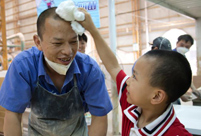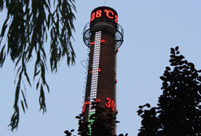 Amphibious armored vehicle unit conducts open sea drill
Amphibious armored vehicle unit conducts open sea drill
 Water relay in Henan
Water relay in Henan
 Ethnic culture feasts eyes of travelers
Ethnic culture feasts eyes of travelers
 80 security dogs assembled in Nanjing police dog training base
80 security dogs assembled in Nanjing police dog training base
 Graffiti artists paint on street walls in Xinjiang
Graffiti artists paint on street walls in Xinjiang
 Story of ceramic artist Zhang Lingyun
Story of ceramic artist Zhang Lingyun
 Magic summer night dream in Hongyuan
Magic summer night dream in Hongyuan
 Incredible creatures in headwaters drainage region of Lancang River
Incredible creatures in headwaters drainage region of Lancang River
 The future of rock n' roll seen in young rockers in China
The future of rock n' roll seen in young rockers in China
 Magnificent Yanziya Cliff
Magnificent Yanziya Cliff
The World Health Organization (WHO) on Tuesday said it is ethical to offer unproven interventions with as yet unknown efficacy and adverse effects, as potential treatment or prevention in particular circumstances of Ebola outbreak.
On Monday, WHO convened a panel of medical ethicists, scientific experts, and lay people from affected countries to assess the role of experimental therapies in the Ebola outbreak.
WHO said over the past decade, research efforts have been invested into developing drugs and vaccines for Ebola virus disease. Some of these have shown promising results in the laboratory, but they have not yet been evaluated for safety and efficacy in human beings.
It added the large number of people affected by the 2014 west Africa outbreak, and the high fatality rate, have prompted calls to use experimental medical interventions to try to save the lives of patients and to curb the epidemic.
The panel agreed that ethical criteria must guide the provision of such interventions, which including transparency about all aspects of care, informed consent, freedom of choice, confidentiality, respect for the person, preservation of dignity and involvement of the community.
In order to understand the safety and efficacy of these interventions, the panel advised that, if and when they are used to treat patients, there is a moral obligation to collect and share all data generated, including from treatments provided for “compassionate use” (access to an unapproved drug outside of a clinical trial).
The panel decided that there is a moral duty to evaluate these interventions, for treatment or prevention, in the best possible clinical trials under the circumstances in order to definitively prove their safety and efficacy or provide evidence to stop their utilization.
In addition, the panel identified areas that need more detailed analysis and discussion, such as ethical ways to gather data, prioritize the use of unregistered experimental therapies and vaccines, as well as fair distribute in communities and among countries.
As of Aug. 9, the cumulative number of cases attributed to Ebola virus disease in Guinea, Liberia, Nigeria, and Sierra Leone stands at 1,848, including 1,013 deaths.
 Beijing policewomen posters become a hit
Beijing policewomen posters become a hit Armored regiment trains on the sea
Armored regiment trains on the sea Children spend 'Father's Day' with dads at work
Children spend 'Father's Day' with dads at work 'Pan Da' appear in Shanghai World Financial Center
'Pan Da' appear in Shanghai World Financial Center Champions take selfies on podium
Champions take selfies on podium National Fitness Day celebrated around China
National Fitness Day celebrated around China Traditional culture colors summer vacation
Traditional culture colors summer vacation Young athletes fighting for their dreams
Young athletes fighting for their dreams 68 meters high thermometer in Shanxi, called ‘fighter’ of thermometers
68 meters high thermometer in Shanxi, called ‘fighter’ of thermometers The vanishing folk skills
The vanishing folk skills Intoxicating beauty of Dali, Yunnan province
Intoxicating beauty of Dali, Yunnan province Memorable moments of Ludian earthquake
Memorable moments of Ludian earthquake Bring world together to help elephant
Bring world together to help elephant 'Building Dreams'
'Building Dreams'  Labrang Monastery
Labrang MonasteryDay|Week|Month